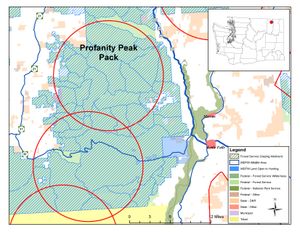Making political hay out of Profanity Peak wolf pack culling
ENDANGERED SPECIES -- Northeastern Washington politicians apparently see the state's mission to cull a portion of the cattle-killing Profanity Peak wolf pack as another way to get votes by slamming government agencies.
Washington Department of Fish and Wildlife officials are addressing the volatile issue of a protected species that's attacking private property on public land. At least two wolves have been killed so far, they announced last week.
They're working under guidelines established by an advisory group composed of a range of expertise and interest, including unabashed wolf lovers and people who would rather see wolves eliminated as well as people who have beliefs in between those extremes.
These people devoted the time and had the guts to sit across from each other at meetings and hash out a protocol. That means they worked toward a solution through compromise.
Letting wolves kill livestock at will isn't an option, and neither is wolf extermination.
The Wolf Advisory Group supports the agency in subduing publicity to avoid luring protesters and making a dangerous circus out of the operation. The wolf culling involves state staff in helicopters and cooperating livestock range riders on horseback -- both are rife with dangers even without interference.
But politicians sitting in their offices looking for votes in conservative rural counties would rather dismiss all that citizen effort -- and operation safety -- in order to make the state agency look like conniving bad guys.
Because the agency staffers are giving weekly rather than daily reports and not setting an exact quota of wolves to be killed in the operation, they're being criticized.
“It doesn’t engender a lot of trust, does it?” state Sen. Brian Dansel of Ferry County told the Capital Press.
Ferry County Commissioner Mike Blankenship criticized the department for not being upfront about its plans.
“I think it needs to be public and if the bleeding hearts want to put pressure on them, let’s expose who’s doing it,” Blankenship told the ag-focused publication.
“We’re not convinced as of yet that (WDFW’s) intent is to do what needs to be done,” he's quoted as saying. “There are still nine animals that need to be removed,” he added referring to his position that the 11-wolf pack should be wiped out.
Excuse me, Mr. Blankenship, but until you get the Washington Legislature and Congress to authorize wolf extermination, quit demanding that state agency staff break the law.
Stevens County rancher Scott Nielsen, vice president of the Cattle Producers of Washington, told the Capital Press that not announcing a number beforehand might help the WDFW to describe the mission a success later.
“That’s the beauty of not telling people,” he said. “I think they should tell us what they’re going to do.”
The Ferry County Sheriff's Department played its own politics last week by leaking the wolf kill count a few days before the agency was to release the status statement. The WDFW keeps him in the loop because he's a law enforcement official and he flaps his lips.
The sheriff answers to his local constituency. Fine. That's the advantage of not having to answer to the broader statewide constituency of a state agency -- he can be a local hero for being uncooperative and a bit reckless with the safety of government workers and a few cowboys.
It serves absolutely no good purpose to give a daily wolf body count. None.
Let the people out there in that rugged country do their job without making a spectacle that can only attract more interference.
Some of those people not only are working their butts off in hazardous terrain, they are risking their lives.

